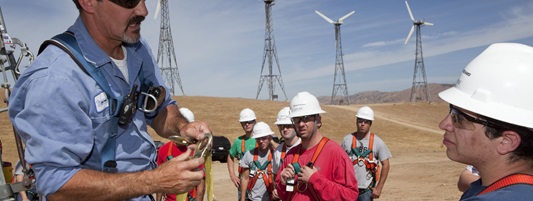The Call to Action on Skilling for the Energy Transition aims to accelerate international cooperation on education and workforce development for a sustainable energy future by building an enhanced awareness of the global skills landscape and inspiring ambitious action. Stakeholders, including from government, industry, education and training, labour, civil society and other local and international entities, are invited to share concrete measures and commitments to accelerate domestic and global skilling for the energy transition. Contributions will feature as part of a showcase of actions from around the world, encouraging collaborative efforts to replicate and scale-up promising initiatives while leveraging collective expertise.
To join, complete the form on the following page.
Context
At COP28, under the UAE Consensus, governments committed to work toward a tripling of renewable electricity capacity globally and a doubling of the global average annual rate of energy efficiency improvements by 2030. This energy transition will have profound implications for the workforce.
A Paris Climate Agreement-compliant pathway has the potential to create around 30 million renewable energy jobs and 77 million jobs in other transition-related sectors, such as energy efficiency, power grids and energy flexibility, and hydrogen, by 2030, according to the International Renewable Energy Agency (IRENA).
Achieving energy transition goals while maximizing socio-economic benefits calls for the development of an inclusive and competent talent pool, as well as the upskilling and reskilling of workers in existing energy industries. Investment in education and training will be vital for equipping both the current and future workforce, including women and youth, with the skills and competences needed to fully seize the livelihood opportunities created by the energy transition.
Acute skills shortages could constrain growth along the entire value chain, including in manufacturing, development, installation, operation and maintenance, necessitating urgent action to scale up workforce development and build resilient supply chains. Building a robust enabling environment also requires targeted skill development in areas such as energy governance (policy, planning and regulation), finance, business, law, education and community development. To this end, the renewable energy sector must draw on a diverse pool of skills and professions.
Advancements in areas such as digitalisation and artificial intelligence will have further ramifications for the future of jobs and skills in the sector, requiring enhanced measures to prepare the workforce for both a digital and green transition.
Globally recognised skills standards and certifications will also become increasingly important to ensure that education and training offerings meet the needs of industry while facilitating workforce mobility. Accelerating skilling for the energy transition demands a collaborative and concerted effort that brings together governments, industry, education and training providers, youth organisations, trade unions, civil society and other local and international stakeholders.
Priority Actions
Against this background, the Call to Action on Skilling for the Energy Transition invites collective efforts to build the skills required to meet global energy transition ambitions, including workforce development in support of the 30 million renewable energy jobs that could be created by 2030.
The Call to Action identifies the following four priority actions, each with a set of specific measures, to accelerate skill development:
- Integrate Skill Development within Energy and Climate Plans and Policies
- Establish policies that prioritise renewable energy training and education as key components of the energy transition and incorporate skill development within national and global climate and energy plans and targets, including updates of Nationally Determined Contributions (NDCs).
- Commit to inclusive workforce and skilling policies and measures that address the needs of underrepresented groups, including women and youth, and that accordingly allow industry and employers to tap into a broad pool of talent.
- Support innovative financing mechanisms to enable access to skills development and training for all, including dedicated transition training funds.
- Improve data availability on skill supply and demand including the integration of renewable energy related occupations in national labour statistics.
- Undertake Targeted Skill Development to Address Current and Emerging Gaps
- Promote the development of digital skills to equip the workforce for a digitally enabled energy transition while addressing the digital divide.
- Facilitate the growth of equipment and component manufacturing skills to support the establishment of local and regional renewable energy production hubs.
- Expand skill development along all segments of the value chain as well as in key enabling and supporting areas such as policy, finance, education, law and business.
- Enhance skills for decentralized renewable energy to empower communities and promote energy access.
- Establish Partnerships to Accelerate Workforce Development and Promote Skills Standards
- Foster collaboration between governments, industry, labour, civil society, research institutions, and education and training providers to scale up skilling initiatives and make skills development part of employer-union social dialogue.
- Strengthen international standards and harmonization of renewable energy qualifications to enhance quality and consistency, promote workforce mobility and facilitate mutual recognition across borders.
- Integrate Renewable Energy Competencies into Curricula
- Ensure that renewable energy knowledge, skills, and competencies are embedded in educational curricula across disciplines and at all levels, including primary and secondary education, higher education and technical and vocational education and training (TVET).
- Promote awareness-raising efforts that inspire young people as well as current workers to pursue careers in the green economy, including those from under-represented groups.
- Build the capacity of educators, including teachers, lecturers and trainers, to empower them to integrate the latest renewable energy knowledge into their teaching practice.
For further information on the Call to Action, contact education@irena.org.
